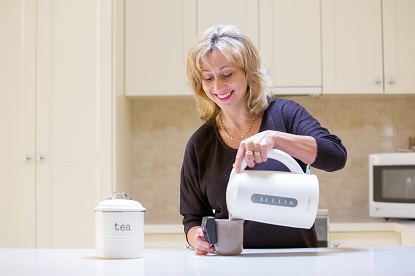Whether you’re about to hop back into the kitchen with lower vision, or just want to improve your skills, it’s good to get advice. We spoke with Occupational Therapist Melanie Leung to get some basic tips to help you whip up a culinary masterpiece.
1. Get organised
Melanie recommends getting familiar with your kitchen, and especially having a system for locating everything you need.
This means having set locations for ingredients, spices and utensils. This will help you quickly navigate your kitchen and grab everything you need.
The most important part of this tip is to make sure everything goes back in its place, so Melanie recommends having a conversation with your family to make sure they know the rules!
2. Set timers
“If you time how long it takes to boil water, then next time you can just set a timer,” Melanie says. This goes for everything, whether it’s frying garlic or roasting a chicken.
Melanie also works with clients to help them work out a timing system that suit them. She says many clients use smartphone timers, or purchase a large print low vision timer.
3. Make it brighter
If you’re cooking with low vision, adding a light source can make all the difference.
This could mean moving a lamp into the kitchen, or installing an LED strip light under the kitchen counter.
“LED lighting can be plugged into the wall, so you don’t even need to bring in a handy man,” Melanie says.
It can be helpful to have your lighting needs assessed, so you can work out exactly what you need.
Melanie says you can put a light anywhere - one of her clients added one inside the fridge!
4. Get to know your oven
For her clients, Melanie suggests marking your oven and cooktop.
“If you add raised markings on your cooktop to the side of each burner, you’ll know where to place your pots when it’s hot,” Melanie says.
She also recommends adding raised markings around the oven dial so you know the right spots for certain temperatures.

5. Find the tools that suit you
Everybody cooks differently, so it’s important to work out what tools you need to get the job done. Melanie works with clients to identify the most appropriate items, but had some general recommendations.
If you like baking but have trouble with measuring flour, you could get a talking scale, or for many people Melanie recommends long heatproof oven mitts for taking things out of the oven.
Our Vision Store sells a range of items to help you in the kitchen, or if you want specific help, you can connect with us and speak to an Occupational Therapist one on one.










